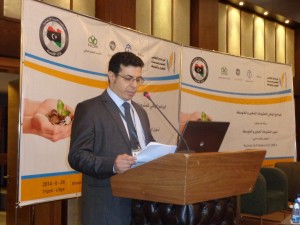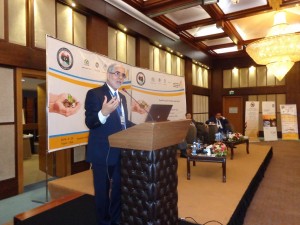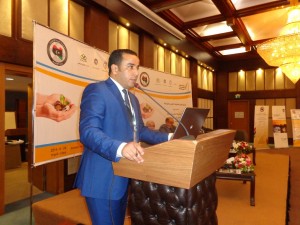By Sami Zaptia.

Tripoli, 26 June 2014:
The General Manager of Libya Enterprise (LE), Abdalnasr Abouzkeh, has criticised the fact that despite the availability . . .[restrict]of a potential LD 40 billion for the provision of SME loans, the government was still unable to come up with a mechanism to access this.
He was speaking at the one-day workshop held Thursday at the Radisson Hotel organised by Libya Enterprise, the SME department of the Ministry of Economy. The workshop was entitled “Access to Finance for SMEs – Policies, Mechanisms, Risks – Growing the Libyan Economy”.
The event was sponsored by Gumhuriya bank, Upper Quartile and the National Commercial Bank.
Abouzkeh said that SME Funds need the cooperation of all Libyan sectors, including banks. It could be the exclusive domain of Libya Enterprise. The role of SME s in job creation was taken as given and therefore so was their contribution to GDP.
He complained about the fact that the three years since the 17 February 2011 Revolution had witnessed increased budgetary allocations to state sector employees’ salaries and subsidies – at the expense of other developmental sections of the budget.
The only way out of this impasse for Libya was through the private sector and by the development of the SME sector, he urged. The Libya Enterprise General Manager criticised the LD 14 billion allocated to subsidies in the budget, saying if only half a billion were allocated to SMEs this would be equate to LD 4-5 billion in terms of the leverage of bank loans, state-sector salary savings and positive multiplier effects on the economy.
With regards to the specific subject of access of SMEs to bank finance, Abouzkeh again bemoaned the fact that Libyan banks had LD 40 billion available for loans and credit, yet the state was still unable to find mechanisms to activate this. The banking sector urgently needed guarantees in the form of legislation in order to gain access to this dormant liquidity, he explained.
On the matter of the five SME Funds created by Libya Enterprise, Abouzkeh explained that these Funds, distributed across Libya’s five main cities, were created to operate in a Sharia-compliant banking system, and therefore were ready for the implementation of Islamic banking, nominally set for 2015.
However, Libya’s current political and budgetary stalemate had meant that the activation of these Funds have been delayed.
Throwing light on the current practice of banks demanding a guarantor for a loan applicant’s salary, Abouzkeh said that Libya Enterprise would, under the new Funds’ rules, act as the loan’s guarantor – but only for approved SME projects. Libya Enterprise would guarantee both the Funds’ and banks’ rights and the LE Funds would in effect act as a tool for banks to invest their dormant finances, Abouzkeh explained.

Mustafa Abushagur, former Deputy Prime Minister under Prime Minister Abdulrahim Al-Kib, Prime Minister designate and current House of Representatives candidate, reviewed in his presentation his broad knowledge and experience in SME funding.
Abushagur, the only speaker to have participated in multimillion dollar SME financing across the world, including venture capital. Abushagur stressed that the right eco-system was needed for SME funding – starting with adequate incentivizing legislation.
The former Prime Minister designate also felt that it was necessary to have the right infrastructure and research centres and universities working on SMEs and financing as well as engendering the right culture regarding successful SME champions.
This includes access to well trained and experiences human resources and professional staff in SMEs and their finance, including lawyers and accountants. There needs to be developed markets for SME products too, he stressed.
Abushagur also urged that Libya’s prohibitive bankruptcy laws be reformed, noting that in the USA, for example, bankrupts were able to continue operating without being excluded or stigmatized.
James Blewett, an investment fund consultant of Upper Quartile, with experience in Asia, Africa and Eastern Europe in his presentation said that the rationale of any government’s granting-giving and how it fits with other finance mechanisms, was important.
Blewett said that selecting projects for grants or funding and how effective this process is and how it is operated are all key.
The rationale of most grants or loans given is based on an expectation of future returns, but that in times of uncertainty, there is a greater risk. Grants reduce the risk gap, he explained, tipping the balance in the investment decision. Therefore, grants help, rather than hinder or replace, other finance mechanisms if used strategically.
Projects can be chosen for policy objectives such as job creation, whilst others can be selected for investment purposes, he explained. The best projects are those that meet both possible objectives.
The issue of grant structures, their distribution and make up is also key. A grant structure for a business plan that involves a project and a business model and a policy objective of LE and Libya will have commercial returns and a public good.
The mechanism of disbursing grants is also key, in that grants should incentivize projects and not finance them. Advance payments are not advisable, with disbursement being about 63 percent for the project, 23 percent for the business model and a final 13 percent for policy objectives achieved.
The make-up of a grant should combine cash and technical assisstance to be provided at the time of operating the business. LE should also endeavor to build-up the business development market , he explained.
Ultimately, Blewett said that SME projects should be receiving the right amount of money, in the right way, to the right people – to do the right thing.

Ashraf Hassan head of the SME loans department of the National Commercial Bank (NCB) in his presentation, reviewed his bank’s experience with SME loans since 2008.
Hassan said that the NCB has five regional units in Libya’s five main cities of Tripoli, Benghazi, Misrata, Zawia and Sebha, concerned specifically SME loans. Specific SME loans training for staff was also provided for personnel in these units.
Reviewing the history of SME funding which theoretically started under the previous regime, Hassan said that the NCB had signed an agreement with the then Loans Guarantee Fund (LGF) in 2008. As a result, LD 100 million was set aside by NCB for SME loans, including a section specifically for university leavers.
The LGF was to provide 70 percent of the grant/loan whilst the NCB was to provide the balance of 30 percent. However, since 2008 and out of the LD 100 million set aside, only six loans were ever provided totaling a miserly LD 6 million, the NCB manager revealed.
Moreover, these were restricted to the relatively safe projects of purchasing trucks for sale on an Islamic style hire purchase process to the debtors.
Hassan reviewed and displayed why he felt the SME loans programme had failed under the previous regime and since 2008.
Most SME project owners had no clear visions of, or for their proposed projects. They overwhelmingly had no realistic feasibility study and no real business model or plan. The business plans presented were most of the time a poor precursor to gain access to loans which most saw as a gift from the state as an entitled form of social security.
Equally, Hassan said that there was a lack of coordination between the LGF, the then SME Department and the NCB. A joint committee was needed to pre-filter projects and applicants so as to avoid duplication f efforts and save time.
Ultimately, Hassan admitted that from the NCB’s point of view, there existed and still continues until today, no adequate legislation to protect the capital of the NCB in the form of loans – which ultimately is depositor’s capital and which the bank is obliged to protect.
Osama Ibrahim, the Central Bank of Libya’s (CBL) Research Centre revealed in his presentation that the CBL had conducted a one year study in the “Risk of SME Loans”. He admitted that over the years, large amounts of money had been disbursed by banks – with little positive results in return.
There was a lack of honesty and transparency by loan applicants, with unrealistic business plans, revealing that over 65 percent of loans granted were not used for their intended purpose. They were used to buy luxuries, property, finance weddings or other personal expenditures, he explained.
The CBL man also criticized banks for their prohibitive bureaucracy in the loans application , which acted as a huge barrier to the disbursement of bank loans. These included demands for documents that acted as a deterrent rather than an incentive.
There was no unified database or system between banks to monitor loan applicants in order to prevent duplication or to prevent access to loans for bad debtors. Banks were also unable to check the claimed facts within applications and business plans. Ultimately, 36 percent of debtors who obtained loans were not entitled to them.
Banks also had no procedures or capabilities for following up or monitoring how in reality debtors utilized their loans.
The government did not have a clear long term strategy for SME loans and it did not adequately prepare the necessary infrastructure for SMEs such as the provision of industrial zones, the CBL man concluded. [/restrict]










